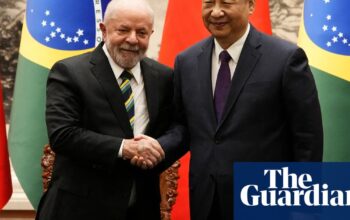
Quebec separation is back among the living.
Years after many considered it dead, the prospect of removing Canada’s second-most populous province from the federation has re-entered the political debate. And though Quebecers aren’t exactly marching in the streets in its support as they once did, they are certainly taking another look at the Parti Québécois.
The PQ, formed in 1968 expressly to make a country out of the province, is by far the most popular political party in the land, with a bevy of polls suggesting it could form a majority government were an election held today.
In October, the party won a byelection in the Quebec City-area riding of Jean-Talon, long a stronghold of the governing Coalition Avenir Québec, or CAQ. More recently, the PQ released its “year one” budget, essentially an advertisement for the alleged economic benefits of a sovereign Quebec.
Yet the PQ’s resurgence has less to do with a revival of separatist spirits than its leader, Paul St-Pierre Plamondon. Elected party leader in the doldrums of 2020, the gen X St-Pierre Plamondon is a contrast to the PQ’s boomer-dominated constituency.
St-Pierre Plamondon is novel for other reasons. He speaks often and loudly about the act of separation itself, even musing about creating a standing army and printing a Québécois currency. It’s a marked difference from many PQ leaders before him, who often avoided speaking about the issue for fear of alienating voters. Nor is St-Pierre Plamondon above often-cringeworthy TikTok meme attempts extolling the delights of a separate Quebec.
Yet if the PQ is the choix du jour for an increasing number of Quebecers, it’s also due to the political collapse of the current CAQ government. Elected in 2018, the caquistes, as they’re known, promised to bring an end to the decades-long obsession with Quebec separation. Led by the longtime separatist (and former PQ cabinet minister) François Legault, the party bills itself as an economy-first coalition of federalists and souverainistes – the preferred term for those who want to make Quebec a country – disillusioned by a half-century of debates over Quebec’s place in Canada.
It worked, in that the CAQ has formed two majority governments since 2018. As recently as 2022, Legault was among the country’s most popular premiers for his handling of the Covid-19 crisis. Yet a series of missteps and scandals have caused his party to plummet back to earth, particularly in its centre of support in the Quebec City region.
Legault reneged on a campaign promise to build an underground tunnel connecting Quebec City with its car-obsessed suburbs to the south. The party was caught peddling access to several CAQ ministers in exchange for donations. And the government paid as much as $7m to bring the Los Angeles Kings to Quebec City to play a game, thinking city dwellers would be chuffed to watch two pre-season NHL games some 30 years years after the city’s cherished Quebec Nordiques moved away. Instead, they were outraged at the price tag.
The PQ’s byelection win last October confirmed a trend illustrated by 11 polls over the last year, said analyst Philippe Fournier. “It’s very linear,” said Fournier, founder of the poll aggregator 338canada.com. “The PQ is directly benefiting from the collapse in CAQ support.”
It isn’t all good news for the party, however. Quebecers have endured two referendums on Quebec sovereignty, in 1980 and 1995, voting to stay in Canada both times. Most Quebecers do not want a third – though St-Pierre Plamondon has promised one in his first mandate, should he win an election.
Unfortunately for the PQ leader, Fournier said, most Quebecers see him as the best leader of a Canadian province, not a separate country. “The PQ has asked me a bunch of questions about this, and they don’t like what I tell them, which is they haven’t created new sovereigntists yet – they’ve only brought the old ones back into the fold.”
Next year, the federalist Quebec Liberals will pick a new leader after more than two years without a permanent one – in large part because no one seems to want the job. The right choice could energize the moribund party, and potentially cause a similar federalist exodus from the CAQ. Should this happen, Quebecers can expect a further collapse of the CAQ – and the return of a certain existential debate of yore.
Martin Patriquin is the Quebec correspondent for the Logic
Source: theguardian.com



